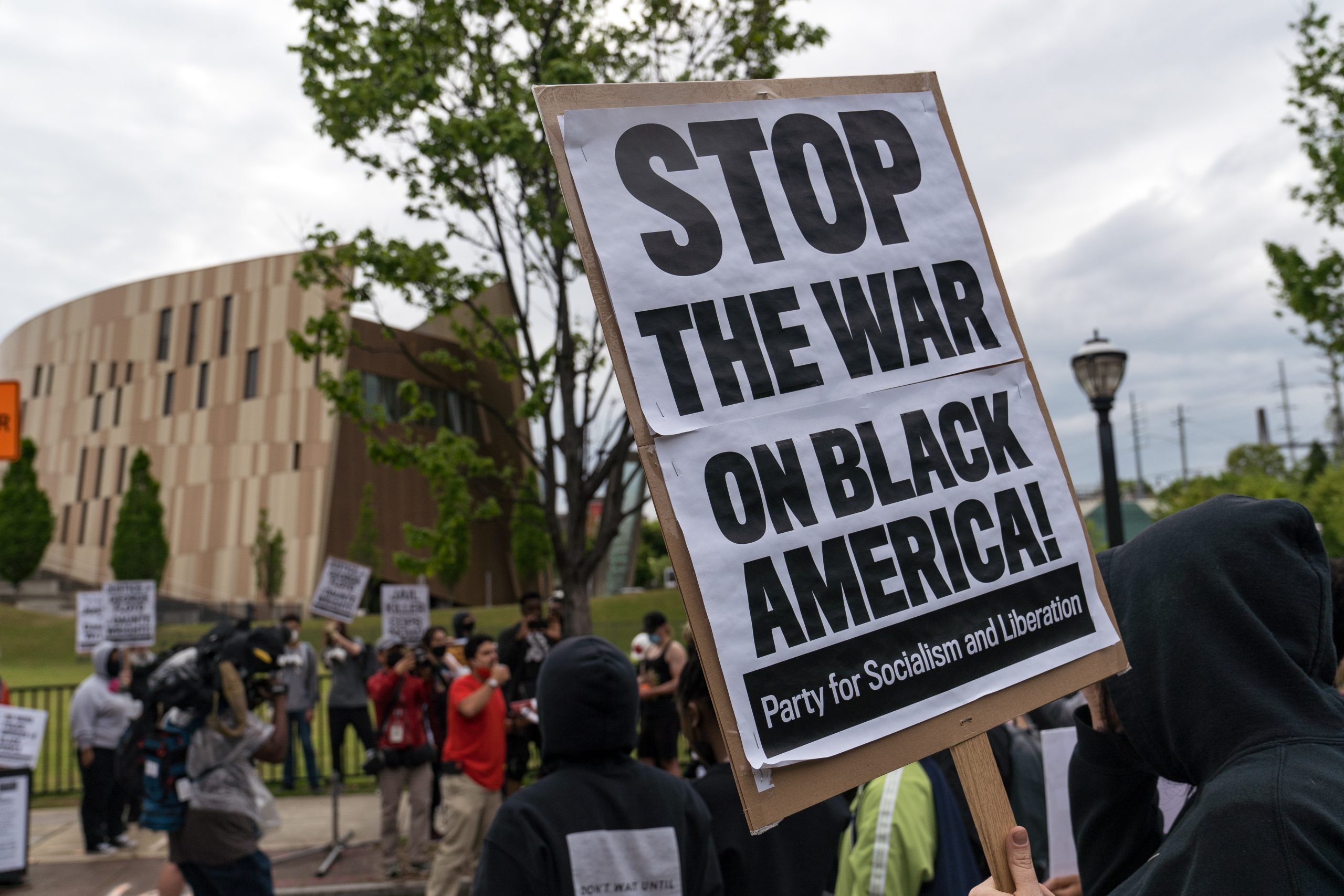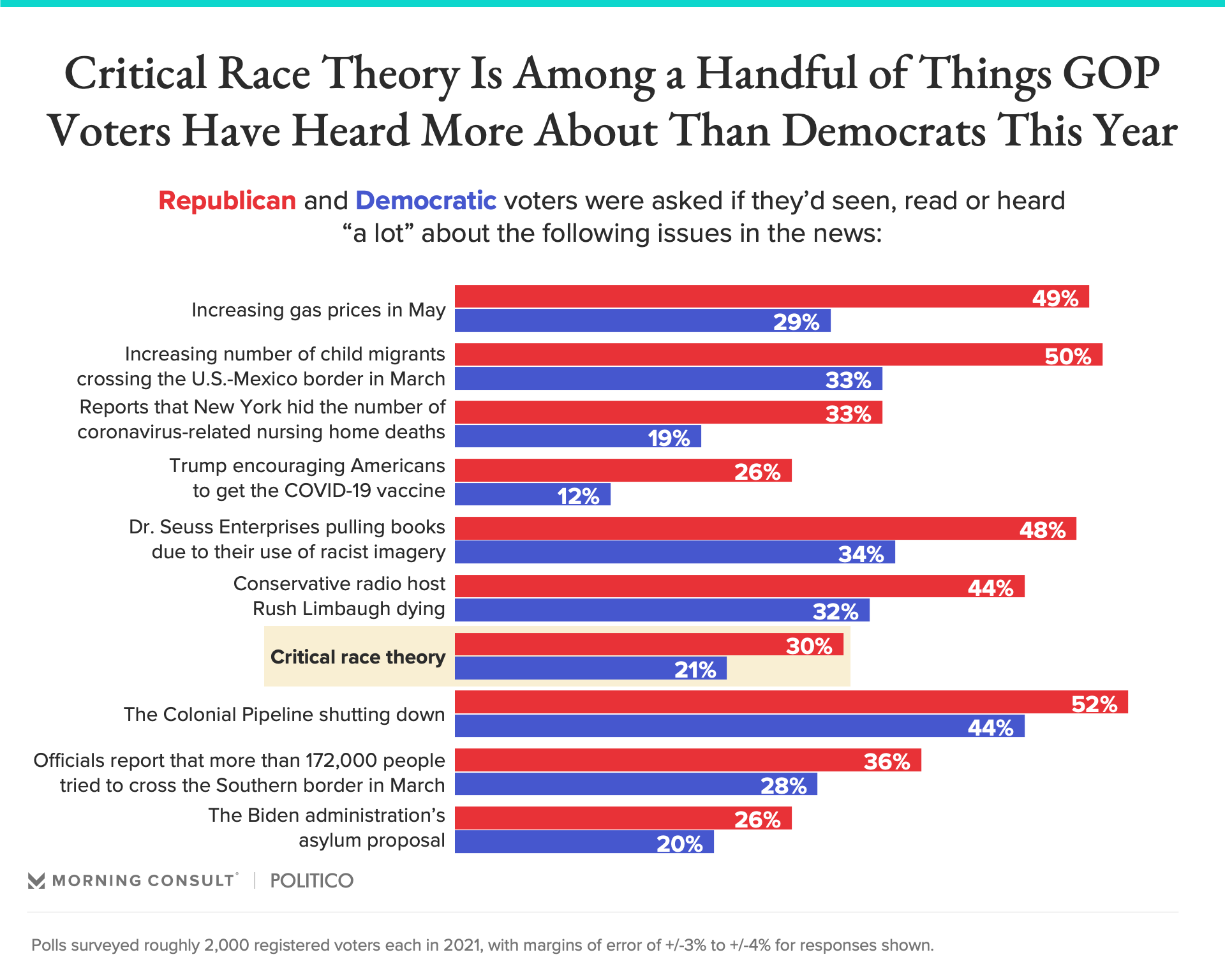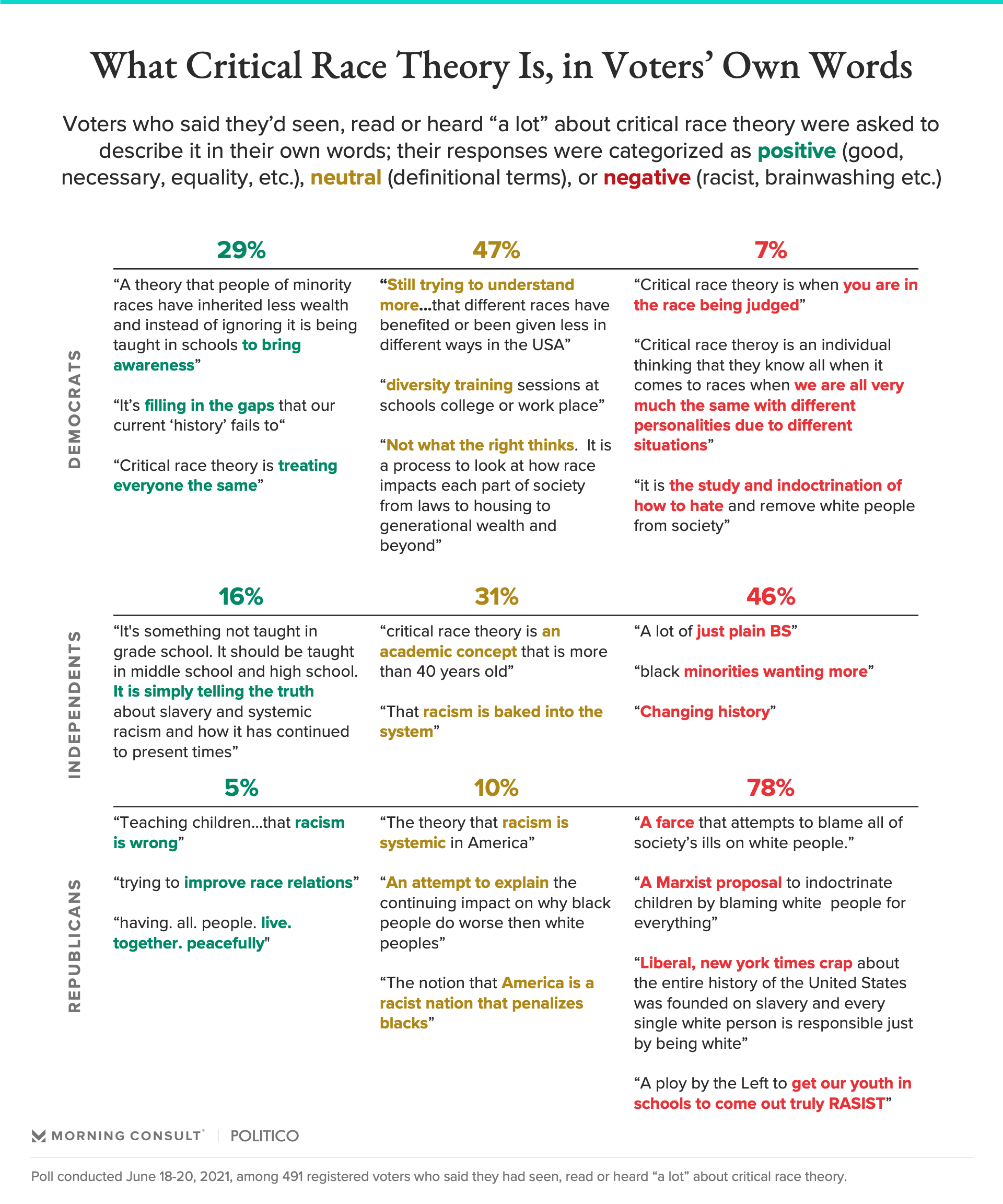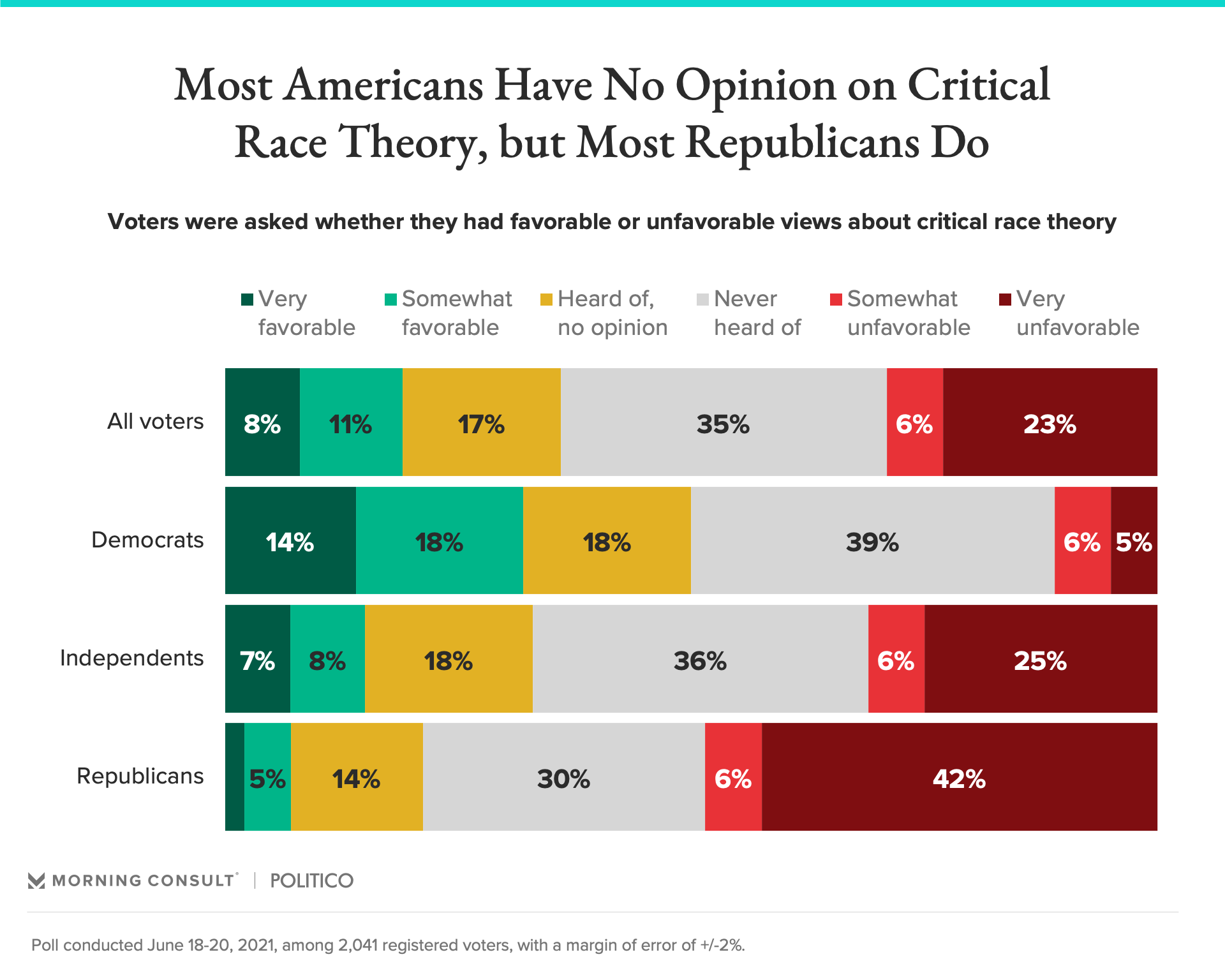We're fukked in 2022:
You are using an out of date browser. It may not display this or other websites correctly.
You should upgrade or use an alternative browser.
You should upgrade or use an alternative browser.
White people are FREAKING OUT about “critical race theory”
- Thread starter ☑︎#VoteDemocrat
- Start date
More options
Who Replied?saturn7
Politics is an EXCHANGE!!!
I happened to catch this today.
GOPer pearl clutches about Critical Race Theory in the military. Great answer from Gen Milley.
The tap dancing response from Sec Austin.

GOPer pearl clutches about Critical Race Theory in the military. Great answer from Gen Milley.
The tap dancing response from Sec Austin.

Many GOP Voters Hold Strong Views on Critical Race Theory. Democrats? Not So Much - Morning Consult

Many GOP Voters Hold Strong Views on Critical Race Theory. Democrats? Not So Much
Open-end test reveals conservative messaging on the topic has found its target audience

Demonstrators march on April 14 to the National Center for Civil and Human Rights in Atlanta while protesting the shooting death of Daunte Wright. With racial inequity featuring more prominently in the national dialogue, right-of-center Americans are increasingly focused on critical race theory, and polling shows Republican voters are developing sharply negative views of the concept. (Megan Varner/Getty Images)
By Eli Yokley
June 23, 2021 at 6:00 am ET
- 30% of GOP voters said they’ve seen, read or heard a lot about critical race theory, compared with 21% of Democrats.
- 48% of GOP voters view critical race theory negatively, including 42% who do so strongly.
- 32% say critical race theory should be taught in schools; 36% disagree.
In turn, Republicans in the electorate have sharper views about the concept – as revealed by an analysis of open-ended responses among those who reported the highest level of awareness.
According to the June 18-20 survey, 3 in 10 Republicans said they’d seen, read or heard “a lot” about critical race theory, compared with 21 percent of Democrats. The skew toward Republican consumption ranked among the largest of roughly 200 other news events and topics tested so far this year, placing it alongside other issues of interest to conservatives such as immigration, increasing gas prices and the Dr. Seuss controversy.

The academic and legal theory, which The New Yorker detailed was elevated last summer by conservative activist Christopher Rufo, has gained prominence on the right over the past year. It is central to Washington’s debate over police reform and other issues of equity in American life that were brought to the forefront during the nationwide Black Lives Matter demonstrations that followed the police murder of George Floyd last year.
A key tenet of critical race theory is that racism is systemic, with deep roots in America that go back to its founding and the embrace of slavery until after the Civil War. The idea seeks to force white Americans in particular to face tough questions about their own actions and those of their ancestors.
Republicans such as Sen. Ted Cruz (R-Texas) have said that the subject is meant to “turn us against each other” under the idea that America is “fundamentally” and “irredeemably racist.” That sentiment was a common one among Republican voters who reported being well-informed on the topic, but was also shared by a sizable chunk of self-described independents – a sign that high-level GOP messaging has broken through to a number of voters.

The poll asked those who said they’d seen, read or heard “a lot” about critical race theory to describe it in their own words. Among informed Republican respondents, nearly 4 in 5 expressed negative sentiment, with one calling the theory a means to make white “people feel guilty about being white” and another saying it is a “way to villainize one race over another with twisted history.”
The largest share of informed independent voters (46 percent) described critical race theory using negative terms, such as “BS” or “anti-white racism,” compared with just 7 percent of Democrats, one of whom characterized the idea as trying “to combat racism by being racist against whites.”
About half of Democrats who said they were informed on the subject expressed neutral views, with less combative language describing the “history of racism in America” or “a movement of civil-rights.”
Among those informed voters with positive views on the subject, there was talk of telling the “truth” or having “serious” conversations. Another talked about how she has been talking to her children about the issues for a while now.
“Teaching how [A]merica favors whites although a lot are unaware that we have systemic racism,” wrote one Democrat in describing critical race theory. “As a middle age[d] white woman I want you to know I have been teaching my kids that all of their lives.”
Along with the open-ended test, the quantitative part of the survey found a similar strength in responses among the larger Republican electorate and weaker views among Democrats and independents.

A third of Democrats (32 percent) said they had favorable views of critical race theory, including 14 percent who said they favor it strongly. Among Republicans, 48 percent view it negatively, and all but 6 percent hold that view strongly.
Asked about the issue more broadly, the survey found that the bulk of the electorate is largely unsure whether critical race theory is a positive or negative thing for society, with a key exception among Republican voters.
But voters overall lean slightly against it being taught in K-12 schools, the subject of an outcry among some state Republican officials. Nationally, 36 percent say it should not be part of the curriculum and 32 percent say it should be included.
The feedback loop the conservative movement is using against “critical race theory”
mediamatters.org
The feedback loop the conservative movement is using against “critical race theory”
7-8 minutes
A feedback loop between powerful right-wing institutions is fueling the GOP’s anti-“critical race theory” strategy, which seeks to turn local debates about school curricula into a polarized national issue Republicans can wield in state and national elections.
Critical race theory is an academic legal framework which examines the systemic impact of racism in the United States. But “critical race theory,” like “cancel culture” and “political correctness” before it, also functions as an umbrella term the right-wing movement uses to turn its mostly white adherents’ racial anxiety into political energy.
There are more than 130,000 K-12 schools in the United States, with more than 13,500 school districts governing the public facilities. As teachers and administrators grapple with how to discuss race and racism in the wake of 2020’s police killings and protests, it is inevitable that some of them will make decisions that are clumsy, ineffective, unpopular, or all of the above.
Such disputes over curricula have traditionally been managed between local officials, educators, parents, and other stakeholders. But the right-wing strategy is to take as many of those instances as they can find, manufacture others, stretch them beyond recognition, dishonestly place them all under the heading of “critical race theory,” give them national media attention, and polarize the debate to try to win elections. And along the way, Republican politicians are passing laws they claim ban “critical race theory” in schools that actually restrict how teachers can discuss a wide range of topics in their classrooms.
Here’s how the strategy works.
Right-wing think tanks came up with a framework for discussing “critical race theory.” As Manhattan Institute senior fellow Christopher Rufo, who helped launch the campaign, has explained, the goal is to “put all of the various cultural insanities under that brand category” so that people “read something crazy in the newspaper and immediately think ‘critical race theory.’” Other right-wing institutions like the newly established Center for Renewing America and the Heritage Foundation followed up on Rufo’s work, putting on events, producing “toolkits” for local activists, writing model legislation, and convening allied lawmakers to discuss state-level bans.
Advocacy groups use the think tank framework to oppose “critical race theory.” There are now “at least 165 local and national groups that aim to disrupt lessons on race and gender,” according to an NBC News analysis. Some, like Fight for Schools and Parents Defending Education, are led by longtime GOP political operatives or right-wing policy analysts, while No Left Turn in Education is led by a local activist with a history of toxic rhetoric.
These groups try to garner attention for their flawed interpretation of “critical race theory.” They highlight controversies in their communities, attend and speak at public meetings, lobby public officials, and appear in local and national media. Their on-the-ground efforts create increased demand for the think tanks’ work.
Advocacy work generates press coverage, particularly from right-wing media. Fox News and other right-wing outlets, their audiences seemingly uninterested in President Joe Biden and his agenda, have spent much of the year focused on ginning up culture war outrages. Critical race theory has taken center stage over the last few months, garnering more than 1,300 Fox mentions along with seemingly endless coverage across the constellation of right-wing news sites.
The anti-“critical race theory” advocacy groups are essential to this push. They provide a steady stream of news hooks, often through local media coverage of their efforts, that can be easily turned into articles or segments for the national right-wing media audience. For example, Fox has provided a series of reports about “critical race theory” in schools in Loudoun County, Virginia, often featuring the commentary of Ian Prior, a GOP operative and executive director of Fight For Schools who lives there. (County school officials say critical race theory is not taught in the district.)
Such right-wing media attention gives the advocacy groups a national platform that helps them raise funds and gain new recruits. According to No Left Turn’s Elana Fishbein, for example, her organization’s Facebook page went from fewer than 200 followers to more than 30,000 after she appeared on Tucker Carlson’s Fox show; she now claims 30 chapters in 23 states and has said Carlson “launched our movements.” And right-wing media’s focus on the think tanks’ framework increases the influence of those institutions as well.
Media coverage creates the incentive for GOP politicians to take action. Republican politicians are increasingly indistinguishable from right-wing media personalities, latching on to whatever culture war outrage is currently roiling the GOP base rather than trying to grapple with actual societal problems. As Fox and its ilk made “critical race theory” that subject, GOP candidates and officeholders responded to the incentive the coverage created.
Virginia’s Republican gubernatorial nominee put opposition to “critical race theory” at the center of his campaign, presaging a GOP effort to use it as a core part of its political strategy in the 2022 midterm elections. Meanwhile, at least 25 states have reportedly introduced or passed legislation banning “critical race theory” in public schools or taken other steps to supposedly curtail its spread. Florida and Texas, whose governors are potential GOP presidential candidates, are among the states that enacted such bans.
For the right-wing movement, this is a virtuous cycle. The political action provides more news hooks for right-wing media outlets to cover; creates victories for advocacy groups to claim and rally around; and adopts the framework and echoes the text of model legislation crafted and promoted by the think tanks. That in turn creates incentives for more think tank work, more advocacy, more media coverage, and more political action. And every step creates more of a frenzy among the right-wing base, which shows up everywhere from enraged social media engagement to public meeting uproars.
The current right-wing target is “critical race theory.” But this strategy is plug-and-play and could be used on a host of issues -- the tea party movement of 2009, the opposition to health care reform in 2010, and the anti-social distancing movement of 2020, to take three examples, bear some striking similarities. And the increasingly nationalized character of U.S. politics, the collapse of local newsrooms, and Fox’s outsized influence over the Republican Party and its base have all made it more potent.
What did white people do after they found out Jesus was a black person? The answer to that will also apply to what they'll do if CRT is taught.. 
I have 0 problems with it being discussed in schools.. I just don't see it working.. Not until capitalism is restructured..

I have 0 problems with it being discussed in schools.. I just don't see it working.. Not until capitalism is restructured..
....these the ones you need to watch out for....cac Christian women are the true wolves in sheep's clothing....
Christian lady so racist she don't even notice it...
How you say you don't see skin Color, that's wild racist in itself.
You need to see skin color... To understand the pain one comes from.
Cacs should say the same thing about the holocaust.
Joy ann Reid just BODIED Chris Rufo 
Joy Reid and Opponent of Critical Race Theory Clash In Trainwreck Interview: Next Time ‘Give Me at Least a Chance to Complete Two Sentences’
Watch Joy Reid takedown the architect of the critical race theory culture war in epic debate
@88m3 @ADevilYouKhow @wire28 @dtownreppin214
@dza @wire28 @BigMoneyGrip @Dameon Farrow @re'up @Blackfyre @NY's #1 Draft Pick @Skyfall @2Quik4UHoes

Joy Reid and Opponent of Critical Race Theory Clash In Trainwreck Interview: Next Time ‘Give Me at Least a Chance to Complete Two Sentences’
Watch Joy Reid takedown the architect of the critical race theory culture war in epic debate
@88m3 @ADevilYouKhow @wire28 @dtownreppin214
@dza @wire28 @BigMoneyGrip @Dameon Farrow @re'up @Blackfyre @NY's #1 Draft Pick @Skyfall @2Quik4UHoes
Similar threads
- Replies
- 7
- Views
- 517

